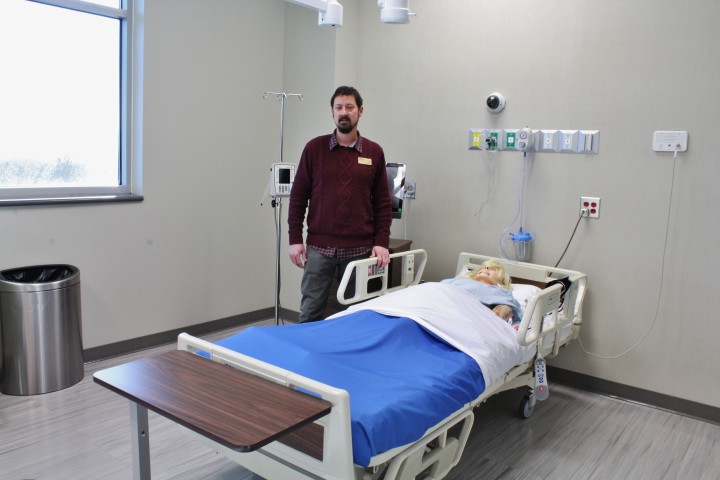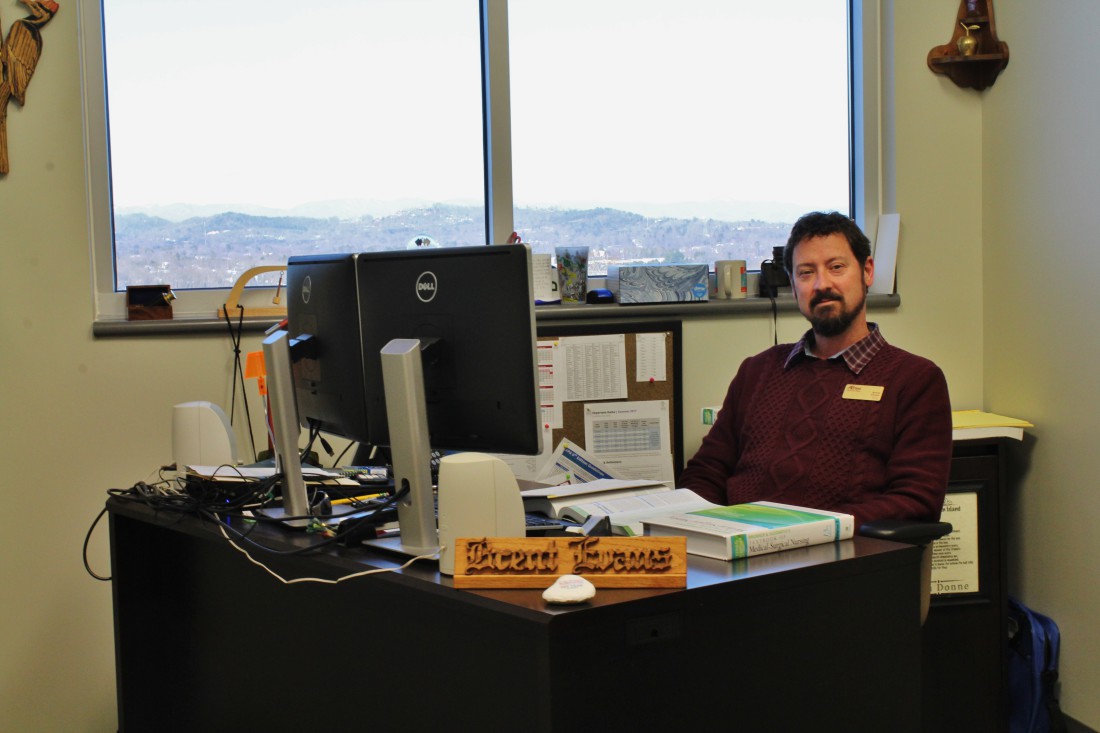Although she admits it may seem cliché, Chelsea King says the best part of her job as a nurse is “just feeling like you’re actually making a difference.”
King received her RN-bachelor of science in nursing from Lenoir Rhyne University in May, after working as a monitor tech at Mission Hospital for the past five years. Since getting her degrees, she has worked on a heart failure floor. She says that although she does love her job, it can also be very stressful.

“I think part of the most stressful thing right now in this part of my job is just the responsibilities that a nurse has,” King says. “I feel like there’s so much accountability and responsibility to catch things. I mean, the doctors aren’t there 24/7, and the nurse is. I just get really stressed, feeling like, ‘Am I going to miss something?’”
She describes the stressful feeling as “being pulled a million different ways,” explaining that sometimes nurses on her floor are given even more patients than usual because of short staffing or a higher demand for patient care.
Similarly, Ashley Shepherd says some aspects of the job can weigh down a nurse over time. “Twelve hours turns into 13 or 14 hours almost daily, with the demands of meetings, classes and everything added to the normal work week.”
Shepherd, a registered nurse at McDowell Hospital, has been a nurse for over 17 years and says some of these factors have affected both her family and her own well-being. “The older my daughter got, the harder it became to balance family and work life,” she says. “My husband works 12-hour shifts as well, so late every evening we are trying to do homework and get ready for the next day. … I have felt guilty as a mother, not having the time to provide my daughter. Also, when you have been in nursing as long as I have, aches and pains set in. So many nurses are dealing with chronic pain issues on a daily basis, which can wear you down mentally and physically.”
Burnout: What is it?
According to a national study by Kronos Inc., 98 percent of nurses said their jobs were both physically and mentally demanding, 85 percent said their job made them feel fatigued, and 63 percent said they felt burned out.
Brent Evans, a nursing faculty member at A-B Tech Community College, describes burnout as an overriding sense of being hopeless and overwhelmed. “For many, it’s the feeling that no matter what you do, it’s not going to be enough, and, ‘I thought I was going to be satisfied,’” he says. “Everybody goes into their profession with some level of idealism, or at least optimism, and it’s the loss of that.”
In such a demanding field of work, Evans says the overall health care environment can sometimes be a leading cause of burnout among nurses. He notes that a common phenomena among health care workers, called “compassion fatigue” (the diminution of compassion over time from working with traumatized patients), can play into nursing burnout. He says all the physical and emotional care that nurses provide can wear them down over time, especially if they don’t feel supported and the hospital is short on staff.
Effects of burnout
The stress and fatigue that nurses often experience can affect their physical health and overall work ability. One study published in the online journal Nursing Research and Practice found that of 120 nurses surveyed, 78 percent slept fewer than eight hours per night, 69 percent did not exercise regularly, and 63 percent consumed fewer than five servings of fruits and vegetables per day. It noted that many of the stress factors and symptoms can be both causes and effects of burnout. For example, lack of sleep can be an effect of burnout but can in turn can cause more burnout.
King says sometimes it’s hard to make time for health-promoting behaviors both inside and outside of work. “It definitely doesn’t help that I can’t find time to exercise and eat healthy,” she says. “I do try making time outside of work, though, to de-stress, if it’s going on a hike, watching Netflix. And I have a 3-year-old, so it’s hard to take time for myself outside of work because the days I’m off I try to spend as much time with her as I can.”

Sarah Neumann Haske, a registered dietitian in Asheville and owner of Neumann Nutrition & Wellness, says lack of sleep and good nutrition are all too often found with a demanding work environment. The effects really take a toll on a person’s job performance, she points out. “You might see your energy levels decline. If you go for hours without eating, and then at the end of the day, you come home and you realize, ‘Wow, I am absolutely starving,’ it becomes a lot harder to choose healthier foods at that point,” she says. “The cravings tend to kick in and take over — you sort of lose control over that. Definitely your blood sugar levels are going to be all over the place, and it affects your mental clarity, how well you’re able to actually do your job.”
Haske stresses the importance of sleep and balanced meals. She says planning is key when it comes to meals, and that if someone has even just a little bit of free time, it’s vital to prepare meals for the week because it ensures balanced meals at work.
These factors, which both cause and are effects of burnout, are all part of a “self-perpetuating cycle,” as Evans describes it. He says a burned-out nurse may call out of work because of sickness or exhaustion, which may result in the hospital being short-staffed, which in turn puts more patients and responsibility onto the staff that is there. Evans says it benefits the hospital when its employees don’t burn out and leave. He notes it can cost a hospital $80,000 in turnaround, hiring and training for a new nurse.
Although many helping professionals experience burnout over time, Evans continues, nurses are especially hard hit because of the combination of long hours with physical and emotional stress. And burnout becomes an institutional as well as a personal problem, he adds, making it especially important to have wellness resources available in the workplace to maintain a healthy environment.
Moving forward
King says she and her coworkers have access to several resources at Mission Hospital, including counseling, mentors and a relaxation room, which provides aromatherapy and massage chairs. She also says her unit at the hospital has monthly meetings in which frustrations with work are discussed and ways to bring happiness into the workplace are explored.
Resources such as relaxation rooms can play a helpful part in preventing burnout among nurses, but nurses also want even more support. According to the Kronos study, “While 60 percent of nurses say their hospital offers a wellness program for employees, only 31 percent agree that their employers make sure they take a meal break, and only 14 percent say their employers ensure they leave on time.” So even if a nurse prepares a well-balanced meal, there may be no time to eat it.
Evans says efficient management in a hospital will make sure nurses feel respected and have a voice in matters on the floor — “shared governance,” he calls it. Flexible scheduling, breaks for meals and a full staff also help create an environment that is less conducive to burnout, he points out.
Evans also encourages nurses to understand their need for self-care: “Advocate for yourself, recognize your need for self-care and expect it. Let that be an expectation that you have of your employer. They benefit when you don’t burn out. The patients benefit when you don’t get burned out and feel like you’re working too hard.”
Worth it
Evans explains how he got into the nursing profession in the first place. After working in finance just out of college, he began to want work that felt more purposeful. He knew several nurses, and from what he knew of the field, he says it seemed like it would be the right fit. “I was familiar with the profession and I wanted, after having worked in a money job for quite a while, I was craving doing something that allowed me to have a positive effect on my community, something I could do to make a living at, but also something I felt good about,” he says.
So Evans went through the registered nursing program at A-B Tech, started working at Mission Hospital, continued his education and realized he wanted to teach. When a position to teach clinicals opened at A-B Tech, he applied and got the job, later securing a full-time position when he received his master’s degree.
Evans says his passion for teaching opened him up to a world of nursing that some may not realize is available. “There’s a wonderful avenue in this profession that can help to avoid burnout, and that is that nursing has been and is becoming more and more a dynamic and varied profession,” he explains. “There are dozens and dozens of different things you can do in nursing. Bedside nursing is only one of those. You can go into management and be part of a good management team, you can go into education, you can do home health, you can do hospice care. There’s just all sorts of things.”
Evans stresses the importance of education as a means of upward mobility in the field and a way to avoid burnout. “The ability to do different roles, which is facilitated by carrying on with education beyond the two-year degree, is one way that nurses can sustain feeling good about their professional life,” he says. He notes that he has never experienced burnout personally, because he followed the education and teaching route rather than providing direct care.
Dsespite burnout, many nurses say they are happy with their work. The same Kronos study that reported high levels of burnout among nurses also found that “93 percent of nurses say that, when they consider all aspects of their work, they are satisfied with being a nurse, and 77 percent note they are energized by their work.”
Shepherd attests to this sentiment. She says that her motivation to become a nurse is very personal, and although she has felt burned out, nursing is her passion. “I became a nurse after my son was born premature at 31 weeks, and he spent six weeks in the NICU at Mission,” she recalls. “I was there every day almost all day and became close with the nurses there. That was my push to go into nursing. I am still a nurse because it is my passion, and I can’t imagine doing anything else.”



This was a very interesting article! A nurses job is ss done!! They are the best asset the Doctors have, Thanks to all these wonder
This was a very interesting article! A nurses job is never done!! They are the backbone for the physicians!! Thanks to all these wonderful health care professionals!!